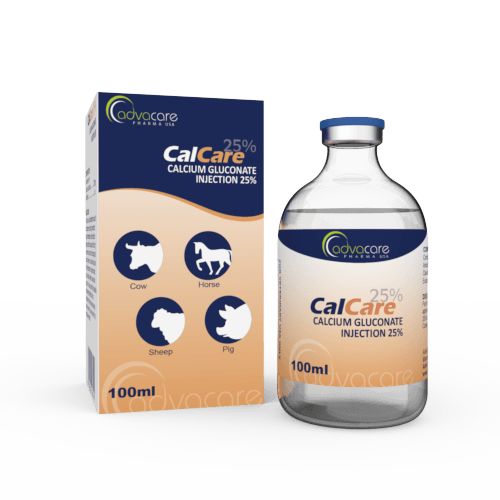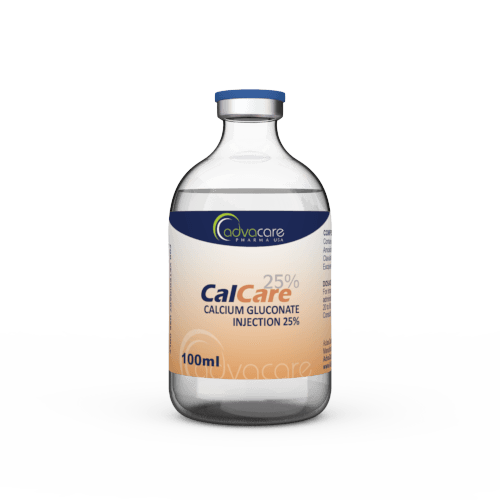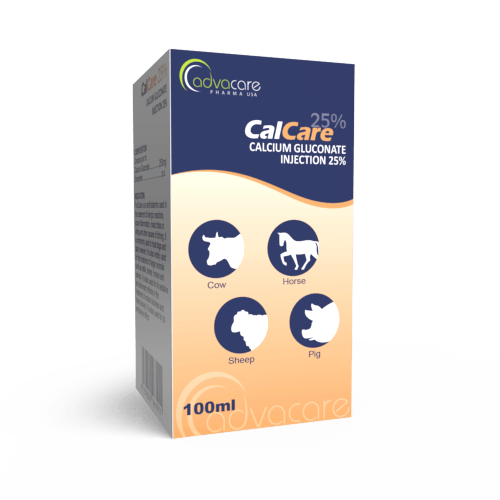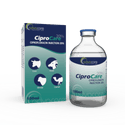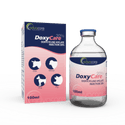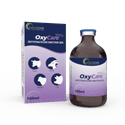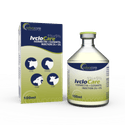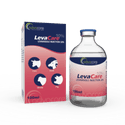- Home›
- Veterinary Pharmaceuticals›
- Veterinary Injections›
- Veterinary Liquid Injections›
- Calcium Gluconate Injection
Calcium Gluconate Injection
Dosage
Packaging
What is Calcium Gluconate?
Active Ingredients: Calcium Gluconate
Calcium Gluconate Injection is used to treat or prevent hypocalcemia associated with many conditions, such as eclampsia, hypoparathyroidism, and renal failure. It is indicated for conditions like milk fever or paresis puerperalis. This drug may be used for many types of animals, including dogs, horses, cows, goats, sheep and pigs.
Calcium gluconate is well-absorbed by parenteral administration, and it is an efficient method of providing a high level of calcium to afflicted animals. The intravenous route ensures the rapid onset of action, which is crucial in cases of acute hypocalcemia. Intramuscular or subcutaneous injections offer a slower release to provide sustained calcium levels in chronic conditions.
Calcium plays a key role in several physiological processes including muscle contraction, nerve conduction, blood clotting, and bone mineralization. Maintaining appropriate calcium levels is essential for the animal's overall health, skeletal integrity, and vital cellular functions.
Calcium gluconate is a mineral that contains 9.3% calcium (about one-third of the calcium that is in calcium chloride). It is the calcium salt of gluconic acid, which is an oxidation product of glucose. The compound's relatively low calcium content means that larger volumes may be required to correct severe deficiencies. However, its stable and non-irritating properties make it a preferred choice when prolonged administration is needed.
Note that these Calcium Gluconate Injections are intended for animal use only and should be prescribed by veterinary doctors or animal care specialists only. Incorrect dosage or unintended contaminants might lead to adverse reactions, ranging from mild irritations to severe complications, including hypercalcemia, which can affect heart rhythm and kidney function. This drug is not for human use.
AdvaCare Pharma is a GMP-certified manufacturer of Calcium Gluconate Injection for animals, with facilities located in China, India, and the US. We offer a broad range of high-quality veterinary medications available for distribution to partners in over 65 countries.
Why are we a trusted Calcium Gluconate manufacturer?
Calcium Gluconate Injection is manufactured and globally distributed by AdvaCare Pharma, a leading manufacturer of veterinary injections in the pharmaceutical industry. We have been committed to distributing high-quality, GMP-certified veterinary medications for the global market over the past 20 years. As a top Calcium Gluconate manufacturer, we ensure that all of our 100+ veterinary injections surpass our distributors' requirements by conducting routine internal and third-party facility audits.
Uses
What is Calcium Gluconate used for?
It's used to treat or prevent hypocalcemia and conditions related to calcium deficiency, such as milk fever.
What animals can be treated with Calcium Gluconate Injection?
This medicine is recommended for horses, dogs, and livestock such as cows, sheep, and pigs.
What are the signs of hypocalcemia in animals?
Signs can vary among species but often include muscle twitching, spasms, stiffness, weakness, incoordination, seizures, and in severe cases, cardiac complications. In dairy cows, it can manifest as milk fever, where the cow is unable to stand post-calving.
What is the difference between Calcium Gluconate and other calcium supplements?
Calcium Gluconate is a specific form of calcium salt derived from gluconic acid, making it distinct from other supplements like calcium chloride or calcium lactate. The concentration of elemental calcium in Calcium Gluconate (approximately 9.3%) is lower compared to some other preparations.
How is a Calcium Gluconate Injection used?
This medication has been manufactured as a sterile, non-pyrogenic liquid, which is packaged in a vial. It is intended to be administered by intramuscular or subcutaneous injection. Calcium Gluconate Injection is intended for veterinary use only.
What precautions should be taken before administering Calcium Gluconate Injection?
Before giving this drug, determine the calcium requirements and serum calcium levels of the animal to avoid hypercalcemia. It is also crucial to check the solution for any particulate matter or discoloration before use.
How does age or lactation status affect an animal's calcium requirement?
Growing animals or those in the early stages of lactation generally have higher calcium needs due to rapid bone development and milk production, respectively. Conversely, older animals or those not lactating might have reduced calcium requirements.
Are there any potential side effects associated with Calcium Gluconate Injection?
Possible side effects include local irritation at the injection site, bradycardia, vasodilation, or hypotension, especially when given rapidly or in large amounts.
How does Calcium Gluconate interact with other medications?
When administered concurrently with other drugs like thiazide diuretics or vitamin D, the risk of hypercalcemia may increase. Calcium Gluconate may also interfere with the absorption of tetracycline antibiotics if given simultaneously. A veterinarian should always be consulted prior to giving any type of medication.
What should be avoided after administering Calcium Gluconate Injection?
After administration, avoid any strenuous activities or stressors for the animal, as these can exacerbate potential side effects. Separate the treated animal from aggressive peers to prevent any injuries, especially if the animal might be weakened or disoriented due to its condition.
How should be done in case of an overdose?
Cease administration immediately, monitor the animal for any signs of hypercalcemia, and initiate symptomatic treatment. Rapid infusion rates should be avoided, as they may exacerbate potential complications.
Is there any specific monitoring required post-administration of Calcium Gluconate Injection?
It is advisable to monitor serum calcium levels to ensure they return to and remain within the normal range. This can also help detect any signs of hypercalcemia or other adverse reactions. Observe the injection site for any signs of irritation or complications.
How should Calcium Gluconate Injection be stored?
This medication should be stored in a dark, dry location under 30°C. The vial should be sealed tightly.
Dosage
How much Calcium Gluconate Injection should be given to cattle?
The usual dose is 250-500ml (Calcium Gluconate 25%), given via slow IV infusion.
How much Calcium Gluconate Injection should be given to sheep?
The usual dose is 1-2ml per kg of body weight. Do not exceed 100ml per injection site.
How much Calcium Gluconate Injection should be given to horses?
For horses, the recommended dosage for Calcium Gluconate Injection ranges between 0.1 to 0.4mg/kg/min.
How much Calcium Gluconate Injection should be given to dogs?
For dogs experiencing hypocalcemia, the recommended dosage of a 12.5% calcium gluconate solution is between 25 to 75mg per pound (50 to 150mg/kg) of body weight.
How much Calcium Gluconate Injection should be given to pigs?
For swine, especially sows showing signs of hypocalcemia or experiencing complications around farrowing, the recommended dosage of calcium gluconate injection is approximately 5 to 10ml per 100 pounds of body weight.
How much Calcium Gluconate Injection should be given to goats?
For goats, particularly those at risk of hypocalcemia during late gestation or post-kidding, the usual dosage of Calcium Gluconate Injection is about 1-3ml per kilogram of body weight. As with sheep, it's advised not to exceed 100ml per injection site.
Refer to a veterinary doctor or pharmacist for guidelines on dosage.
Side Effects
As with all pharmaceuticals, some unwanted effects can occur from the use of Calcium Gluconate Injections.
Some common side effects may include but are not limited to:
- skin or tissue reaction after IM/SC
- vein irritation after IV
- dizziness
- sweating or feelings of warmth
Serious side effects may include:
- allergic reaction (skin rash, fever, facial swelling, or difficulty breathing)
- hypotension
- cardiac arrhythmias
- cardiac arrest
For a comprehensive list of all possible effects of Calcium Gluconate Injections, consult a veterinarian.
Precautions
Do NOT use Calcium Gluconate Injection for animals that:
- have a known allergy or hypersensitivity to any of the ingredients.
- have ventricular fibrillation or hypercalcemia.
- are experiencing digitalis toxicity.
- have hypercalciuria or a history of urinary calculi (stone formation).
Treatment with this drug should be administered with caution in animals that:
- have respiratory failure or respiratory acidosis.
- have heart or kidney problems.
- have digitalis glycosides.
- are being treating with calcitriol (dogs).
There are many known interactions between calcium gluconate and other drugs, including calcium channel blockers, digoxin, magnesium sulfate, neuromuscular blockers, and potassium supplements.
Concurrent administration with thiazide diuretics may increase the risk of hypercalcemia due to reduced renal excretion of calcium. Combining calcium gluconate with vitamin D analogs can also intensify the risk of hypercalcemia, particularly because both have the capacity to elevate serum calcium levels.
What are the most common animals Calcium Gluconate Injection is used for?
Calcium Gluconate Injection is used for a number of animal species, including:
- Cows: In dairy cows, calcium gluconate injection is frequently used to treat milk fever (postparturient hypocalcemia). It is typically administered intravenously, often into the jugular vein, with careful and slow infusion to prevent complications such as cardiac arrhythmias.
- Dogs: For dogs, calcium gluconate injections can be administered to treat conditions like eclampsia after whelping. The drug is given intravenously, with close monitoring during the infusion to avoid adverse reactions.
- Goats: Hypocalcemia can also be treated in goats using calcium gluconate injections. The drug can be given either intravenously or subcutaneously.
- Sheep: Sheep at risk of twin lamb disease or other conditions causing hypocalcemia may benefit from calcium gluconate injections. As with goats, the drug can be administered either IV or subcutaneously, with attention to the rate of administration.
- Pigs: Calcium gluconate injections can be given to address hypocalcemia, especially in sows around the time of farrowing.
- Horses: Horses, though less frequently treated with calcium gluconate injections compared to some other livestock, can receive it in cases of hypocalcemia.

You might be interested in...
Why AdvaCare Pharma?
As an industry leader, we are aware of our responsibility to provide affordable and sustainable solutions to improve healthcare worldwide.
